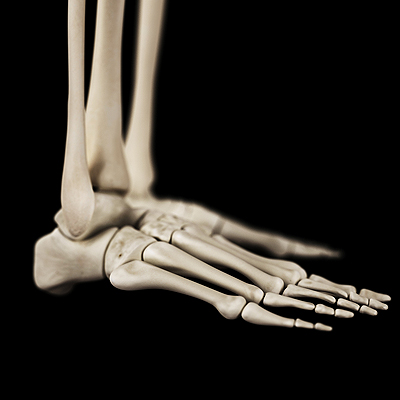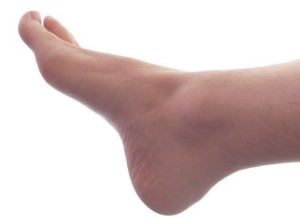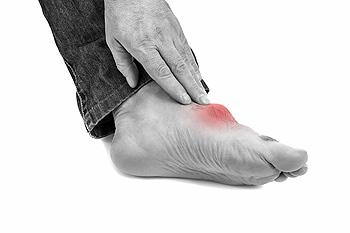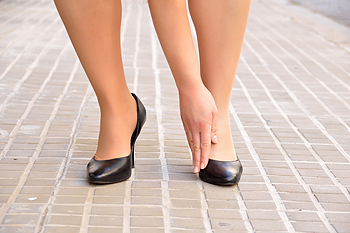Connect With Us
Blog
Items filtered by date: October 2020
Did I Fracture My Foot?
 A broken foot can occur as a simple crack or as a complete break in the bone. Signs of a fractured foot can include tenderness, increased pain when standing or walking, numbness, swelling, bruising, trouble with movement, and an abnormal foot shape. If you believe that you have fractured your foot, you will likely need to visit a podiatrist for a proper diagnosis. In order to properly diagnose a foot fracture, an X-ray, CT scan, MRI or a bone scan will be necessary. Once a foot fracture is diagnosed, a cast, splint, or boot may be needed to limit the foot’s movement. A podiatrist will likely prescribe medicine, and in some cases surgery may be necessary as well.
A broken foot can occur as a simple crack or as a complete break in the bone. Signs of a fractured foot can include tenderness, increased pain when standing or walking, numbness, swelling, bruising, trouble with movement, and an abnormal foot shape. If you believe that you have fractured your foot, you will likely need to visit a podiatrist for a proper diagnosis. In order to properly diagnose a foot fracture, an X-ray, CT scan, MRI or a bone scan will be necessary. Once a foot fracture is diagnosed, a cast, splint, or boot may be needed to limit the foot’s movement. A podiatrist will likely prescribe medicine, and in some cases surgery may be necessary as well.
A broken foot requires immediate medical attention and treatment. If you need your feet checked, contact Michael Tomey, DPM from Cary Foot & Ankle Specialists. Our doctor can provide the care you need to keep you pain-free and on your feet.
Broken Foot Causes, Symptoms, and Treatment
A broken foot is caused by one of the bones in the foot typically breaking when bended, crushed, or stretched beyond its natural capabilities. Usually the location of the fracture indicates how the break occurred, whether it was through an object, fall, or any other type of injury.
Common Symptoms of Broken Feet:
- Bruising
- Pain
- Redness
- Swelling
- Blue in color
- Numbness
- Cold
- Misshapen
- Cuts
- Deformities
Those that suspect they have a broken foot shoot seek urgent medical attention where a medical professional could diagnose the severity.
Treatment for broken bones varies depending on the cause, severity and location. Some will require the use of splints, casts or crutches while others could even involve surgery to repair the broken bones. Personal care includes the use of ice and keeping the foot stabilized and elevated.
If you have any questions please feel free to contact our office located in Cary, NC . We offer the newest diagnostic and treatment technologies for all your foot and ankle needs.
Plantar Hyperhidrosis May Increase the Risk of Other Foot Conditions
 Patients who have excessively sweaty feet may experience a condition that is referred to as plantar hyperhidrosis. This ailment can occur as a result of overactive sweat glands which produce sweat when cooling the body is not necessary. Plantar hyperhidrosis may increase the risk for other foot conditions to develop, including athlete’s foot, warts, and corns. Additionally, shoes may fall off of your feet due to the excess sweat making them slippery, and there may be a strong odor that comes from the feet and shoes. If you are afflicted with plantar hyperhidrosis, it is suggested that you speak with a podiatrist who can determine what the best treatment is for you.
Patients who have excessively sweaty feet may experience a condition that is referred to as plantar hyperhidrosis. This ailment can occur as a result of overactive sweat glands which produce sweat when cooling the body is not necessary. Plantar hyperhidrosis may increase the risk for other foot conditions to develop, including athlete’s foot, warts, and corns. Additionally, shoes may fall off of your feet due to the excess sweat making them slippery, and there may be a strong odor that comes from the feet and shoes. If you are afflicted with plantar hyperhidrosis, it is suggested that you speak with a podiatrist who can determine what the best treatment is for you.
If you are suffering from hyperhidrosis contact Michael Tomey, DPM of Cary Foot & Ankle Specialists. Our doctor can provide the care you need to attend to all of your foot and ankle needs.
Hyperhidrosis of the Feet
Hyperhidrosis is a rare disorder that can cause people to have excessive sweating of their feet. This can usually occur all on its own without rigorous activity involved. People who suffer from hyperhidrosis may also experience sweaty palms.
Although it is said that sweating is a healthy process meant to cool down the body temperature and to maintain a proper internal temperature, hyperhidrosis may prove to be a huge hindrance on a person’s everyday life.
Plantar hyperhidrosis is considered to be the main form of hyperhidrosis. Secondary hyperhidrosis can refer to sweating that occurs in areas other than the feet or hands and armpits. Often this may be a sign of it being related to another medical condition such as menopause, hyperthyroidism and even Parkinson’s disease.
In order to alleviate this condition, it is important to see your doctor so that they may prescribe the necessary medications so that you can begin to live a normal life again. If this is left untreated, it is said that it will persist throughout an individual’s life.
A last resort approach would be surgery, but it is best to speak with your doctor to find out what may be the best treatment for you.
If you have any questions please feel free to contact our office located in Cary, NC . We offer the newest diagnostic and treatment technologies for all your foot and ankle needs.
Gout 101
 Gout is a form of inflammatory arthritis that affects the big toe and can cause severe joint pain. Gout is three times more likely to affect men than women. A proper diagnosis will require a podiatrist to assess the foot and rule out other possible diagnoses. Upon a gout diagnosis, medications such as anti-inflammatory drugs or corticosteroids may be prescribed. However, the typical primary treatment method for gout involves reducing uric acid levels in the blood. While there are many prescriptions that may help reduce these levels, diet is key. Avoiding high purine foods, sugary drinks, and alcohol will help reduce uric acid levels. If you believe that you are suffering from gout, consult with a podiatrist for a proper diagnosis and treatment.
Gout is a form of inflammatory arthritis that affects the big toe and can cause severe joint pain. Gout is three times more likely to affect men than women. A proper diagnosis will require a podiatrist to assess the foot and rule out other possible diagnoses. Upon a gout diagnosis, medications such as anti-inflammatory drugs or corticosteroids may be prescribed. However, the typical primary treatment method for gout involves reducing uric acid levels in the blood. While there are many prescriptions that may help reduce these levels, diet is key. Avoiding high purine foods, sugary drinks, and alcohol will help reduce uric acid levels. If you believe that you are suffering from gout, consult with a podiatrist for a proper diagnosis and treatment.
Gout is a foot condition that requires certain treatment and care. If you are seeking treatment, contact Michael Tomey, DPM from Cary Foot & Ankle Specialists. Our doctor will treat your foot and ankle needs.
What Is Gout?
Gout is a type of arthritis caused by a buildup of uric acid in the bloodstream. It often develops in the foot, especially the big toe area, although it can manifest in other parts of the body as well. Gout can make walking and standing very painful and is especially common in diabetics and the obese.
People typically get gout because of a poor diet. Genetic predisposition is also a factor. The children of parents who have had gout frequently have a chance of developing it themselves.
Gout can easily be identified by redness and inflammation of the big toe and the surrounding areas of the foot. Other symptoms include extreme fatigue, joint pain, and running high fevers. Sometimes corticosteroid drugs can be prescribed to treat gout, but the best way to combat this disease is to get more exercise and eat a better diet.
If you have any questions please feel free to contact our office located in Cary, NC . We offer the newest diagnostic and treatment technologies for all your foot and ankle needs.
Wearing High Heels May Contribute To Certain Foot Conditions
 When high heels are frequently worn, it may lead to the development of various foot conditions. These foot ailments can include plantar fasciitis, bunions, corn and calluses, or hammertoes. Patients who choose to have surgery performed may find wearing high heels to be more comfortable afterward, despite the fact that wearing this type of shoe may have initially caused the pain and discomfort. When high heels are worn, it can be easier for the ankle to twist, which may result in a fracture or sprain. It is generally suggested to wear flat shoes after surgery, and once flexibility, range of motion, and strength in the feet are restored, the body and feet can be more prepared to wear heels again. If you would like additional information about foot conditions that may be caused from wearing high heels, please consult with a podiatrist.
When high heels are frequently worn, it may lead to the development of various foot conditions. These foot ailments can include plantar fasciitis, bunions, corn and calluses, or hammertoes. Patients who choose to have surgery performed may find wearing high heels to be more comfortable afterward, despite the fact that wearing this type of shoe may have initially caused the pain and discomfort. When high heels are worn, it can be easier for the ankle to twist, which may result in a fracture or sprain. It is generally suggested to wear flat shoes after surgery, and once flexibility, range of motion, and strength in the feet are restored, the body and feet can be more prepared to wear heels again. If you would like additional information about foot conditions that may be caused from wearing high heels, please consult with a podiatrist.
High heels have a history of causing foot and ankle problems. If you have any concerns about your feet or ankles, contact Michael Tomey, DPM from Cary Foot & Ankle Specialists. Our doctor can provide the care you need to keep you pain-free and on your feet.
Effects of High Heels on the Feet
High heels are popular shoes among women because of their many styles and societal appeal. Despite this, high heels can still cause many health problems if worn too frequently.
Which Parts of My Body Will Be Affected by High Heels?
- Ankle Joints
- Achilles Tendon – May shorten and stiffen with prolonged wear
- Balls of the Feet
- Knees – Heels cause the knees to bend constantly, creating stress on them
- Back – They decrease the spine’s ability to absorb shock, which may lead to back pain. The vertebrae of the lower back may compress.
What Kinds of Foot Problems Can Develop from Wearing High Heels?
- Corns
- Calluses
- Hammertoe
- Bunions
- Morton’s Neuroma
- Plantar Fasciitis
How Can I Still Wear High Heels and Maintain Foot Health?
If you want to wear high heeled shoes, make sure that you are not wearing them every day, as this will help prevent long term physical problems. Try wearing thicker heels as opposed to stilettos to distribute weight more evenly across the feet. Always make sure you are wearing the proper shoes for the right occasion, such as sneakers for exercising. If you walk to work, try carrying your heels with you and changing into them once you arrive at work. Adding inserts to your heels can help cushion your feet and absorb shock. Full foot inserts or metatarsal pads are available.
If you have any questions please feel free to contact our office located in Cary, NC . We offer the newest diagnostic and treatment technologies for all your foot and ankle needs.
